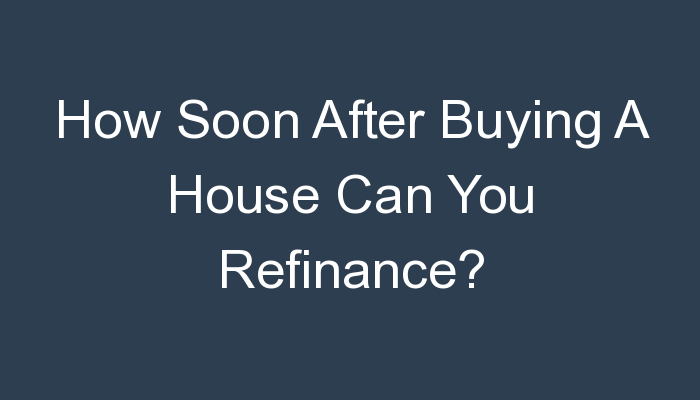Refinancing a mortgage can be an attractive option for many homeowners. Refinancing can help save money on interest payments, lower monthly payments, and even provide access to cash for home improvements or other expenses. But how soon after buying a house can you refinance? The answer is, it depends. Refinancing soon after purchasing a home may not be the best option in some cases.
However, if done correctly, refinancing soon after buying your home can provide you with major benefits—and get you back on track financially much sooner than you might expect. In this article, we’ll go over some of the things to consider when deciding whether or not to refinance your home soon after purchase.
What is refinancing?
If you’ve just bought a home, you may be wondering how soon you can refinance. After all, refinancing can save you money by getting you a lower interest rate or changing the terms of your loan.
So how soon can you refinance after buying a house? The answer is: It depends.
There are a few things that will affect when you can refinance, including:
-The type of loan you have: Some loans, like FHA loans, can be refinanced as soon as six months after they’re originated. Others, like conventional loans, require that you wait at least a year before refinancing.
-Your loan-to-value ratio: This is the amount of your loan compared to the value of your home. If your home has gone up in value since you bought it (which is common), then you may be able to refinance sooner than if the value has stayed the same or gone down.
-Your credit score: A higher credit score will generally qualify you for a lower interest rate, so it may make sense to wait until your score improves before refinancing. That said, even if your score isn’t perfect, there are still options available to help you get a lower rate.
When can you refinance your home?
If you’re looking to lower your monthly mortgage payments or get out of debt quicker, you may be wondering: how soon after buying a house can you refinance?
The answer is, it depends. While you can technically refinance your home the day after you close on it, most lenders won’t allow you to do so until you’ve made a few payments on your loan. This ensures that you have some skin in the game and are less likely to default on your loan.
Typically, you’ll need to wait at least 3-6 months before refinancing your home. But if you have an adjustable rate mortgage (ARM), your lender may require you to wait a bit longer, since these loans typically reset after 5 years.
If you’re interested in refinancing your home sooner rather than later, be sure to talk to your lender about their policies and requirements. They can help you determine if refinancing is right for you and when the best time to do it would be.
What are the benefits of refinancing?
There are many benefits to refinancing your home, including:
-Lowering your monthly mortgage payments
-Accessing equity in your home to use for other purposes
-Getting a lower interest rate
-Shortening the term of your loan
-Changing the type of loan you have
How to refinance your home
If you’re thinking about refinancing your home, there are a few things to keep in mind. First, you’ll need to have equity in your home to be able to refinance. Equity is the portion of your home’s value that you own outright, and it can be calculated by subtracting the outstanding balance on your mortgage from your home’s appraised value.
Once you know how much equity you have, you’ll need to find a lender who is willing to give you a loan for the amount of equity you have in your home. Not all lenders offer loans for home equity, so it’s important to shop around and compare rates and terms before choosing a lender.
Once you’ve found a lender, you’ll need to apply for a loan and go through the underwriting process. This process can take a few weeks, so it’s important to start the process early if you’re hoping to refinance before your current mortgage rate expires.
If everything goes smoothly, you should be able to close on your new loan and start making lower monthly payments. Refinancing can save you money each month, but it’s important to make sure that the overall cost of the loan makes sense for your financial situation.
Conclusion
Refinancing a home is an effective way to save money, but it’s important to understand all the factors that are involved in refinancing. Knowing how soon after buying a house you can refinance and what your options are will help ensure you make the best decision for your financial situation. Make sure you weigh all of these factors before deciding whether or not refinancing is right for you so that you can feel confident with your choice and enjoy the benefits of a lower interest rate!

